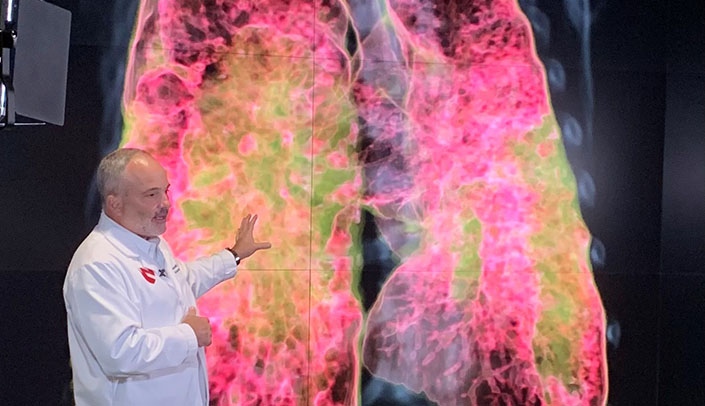UNMC public health and infectious diseases expert James Lawler, MD, on Thursday used video animation created by the Interprofessional Experiential Center for Enduring Learning (iEXCEL) to demonstrate how the SARS-CoV-2 Delta variant attacks the respiratory system in particular and how the COVID-19 vaccines work to repel the highly contagious, rapid-spreading Delta variant.
UNMC’s iEXCEL team in the Davis Global Center created the animation with Peter Angeletti, PhD, of the Nebraska Center for Virology at the University of Nebraska-Lincoln, serving as subject matter expert.
Speaking to media, Dr. Lawler — co-executive director of the Global Center for Health Security at UNMC — said that people should be concerned about the trends the country is seeing
See the press conference with the videos
"I’m very concerned that this Delta wave is actually going to be the worst phase of the pandemic for many parts of the country, particularly areas that have lower vaccine rates," Dr. Lawler said. "And Nebraska is one of the areas of the country that has relatively low vaccination rates, particularly in our more rural counties.
"We need to take rapid action if we are going to avoid experiencing the overwhelming numbers of cases in hospitals that they’re seeing now in places in Florida and Louisiana, Texas, Arkansas, Oklahoma. We really need to act quickly."
With the help of the dynamic video animations and photos, Dr. Lawler made the Delta variant come alive on a 25×10 foot computer-aided design wall in the Davis Global Center. Color video animations showed the Delta variant entering and "hijacking" a cell to create hundreds of thousands of virus particles that infect the body (particularly the lungs) and in turn also can be transmitted to others. Another video animation showed the effects of the COVID vaccine on the Delta variant. The video showed antibodies stopping much of the Delta variant from getting into and infecting a cell.
The simulations are part of UNMC’s ongoing work to develop content for the federal government’s medical first responder training as teaching tools on how COVID infects humans.
Dr. Lawler said genetic variants of SARS-CoV-2 have been emerging and circulating around the world throughout the COVID-19 pandemic and will continue to emerge as long as the virus is allowed to be transmitted from person to person.
Amid the dazzling video animations, Dr. Lawler’s message was one he’s repeated many times.
"We know the most important thing that people can do to protect themselves against the Delta variant is to get vaccinated," he said. "The vaccines dramatically reduce your chances of getting infected and greatly reduce the odds that you’ll end up in the hospital if you do get sick.
"In addition, because we know that vaccinated people still can become infected and transmit the virus to others, wearing face masks in indoor public settings right now while case rates are high is another layer of protection that we can add in addition to all of the other things that we know work to prevent COVID-19 — avoiding crowded indoor gatherings, avoiding confined spaces, all of these things that we’ve used successfully before can still be important tools in the battle against the Delta variant," Dr. Lawler said.

Excellent presentation and the graphics are awesome. Thank you!
This is great. I saw it on the news. Very proud of UNMC and Nebraska Medicine.